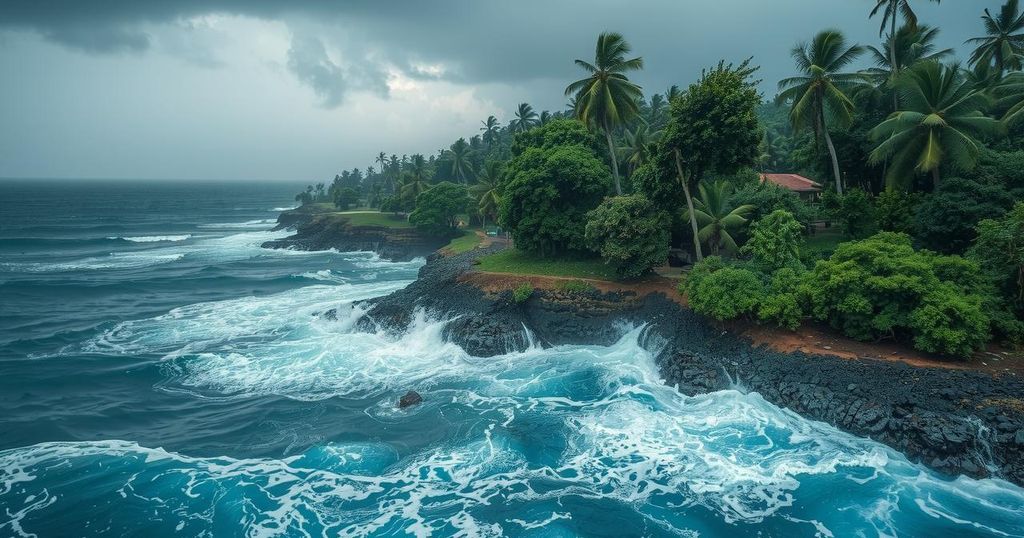Tropical Storm Dikeledi struck northern Mozambique, after resulting in three fatalities in Madagascar and causing flooding in Mayotte. With intense winds and heavy rainfall forecasted, President Nyusi urged residents to seek shelter. The storm follows the earlier devastation caused by Cyclone Chido, emphasizing ongoing risks in the region amid growing concerns over tropical cyclones linked to climate change.
Tropical Storm Dikeledi made landfall in northern Mozambique on Monday, following its destructive path that resulted in at least three fatalities in Madagascar and significant flooding in the French territory of Mayotte. The storm rapidly intensified as it approached Mozambique’s Nampula region, unleashing dangerous winds and heavy rainfall, as reported by Meteo-France, the French meteorological service. In December, Cyclone Chido had previously devastated northern Mozambique, claiming 120 lives and injuring over 5,600 individuals in Mayotte, highlighting the recurring severity of tropical weather in the region.
Mozambique’s National Institute of Meteorology (INAM) has issued urgent flood warnings for Dikeledi, forecasting rainfall amounts reaching up to 200 millimeters (nearly eight inches) within 24 hours, alongside potentially hazardous wind gusts of up to 180 kilometers (110 miles) per hour. In response, President Filipe Nyusi has urged residents located in areas expected to be affected by the storm to take immediate precautions, emphasizing the importance of finding safe shelter and ensuring access to food and water supplies. His directive included an urgent call: “Go immediately to a safe shelter and stay there until the authorities give you further instructions,” during the opening of parliament in Maputo.
As Dikeledi approached Madagascar over the weekend, it caused three fatalities, according to reports from the National Office for Risk and Disaster Management. After making landfall on Madagascar’s northern coastline, the storm escalated as a cyclone resulting in both torrential rains and severe winds. Furthermore, Meteo-France has issued warnings regarding the possibility of additional impacts on Madagascar’s southwestern coast as the storm progresses southward in the coming days. Cyclones typically form in the Indian Ocean between November and March, with current surface water temperatures nearing 30 degrees Celsius (86 degrees Fahrenheit), which contributes to an increase in storm intensity—a phenomenon attributed to global warming also observed in other oceanic regions.
The seasonal occurrence of tropical cyclones in the Indian Ocean ranges from November through March, with increasing intensities linked to elevated surface temperatures. The recent trend of severe cyclones has raised concerns regarding climate phenomena impacting global weather patterns, affecting regions such as Madagascar and Mozambique. Previous cyclones have caused widespread damage, fatalities, and displacements, indicating the necessity for proactive disaster management strategies and community preparedness, especially in vulnerable coastal regions.
In conclusion, Tropical Storm Dikeledi poses a significant threat to northern Mozambique following its destructive impact in Madagascar and Mayotte. Authorities have issued critical flood warnings, and President Nyusi has highlighted the importance of safeguarding lives through proper emergency measures. As the storm progresses, the potential for further devastation warrants close monitoring and preparedness among the affected populations. This situation underscores the increasing urgency for effective climate adaptation strategies in addressing the growing frequency of severe tropical weather events in the region.
Original Source: www.barrons.com






